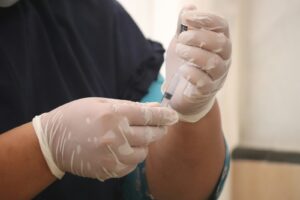‘Inadequate’ PPE putting heath and care workers at ‘serious risk’
The BMA is calling on Public Health England to urgently review the adequacy of its PPE guidance for healthcare staff amid growing concerns that inadequate PPE is placing many at serious risk of Covid-19.
In a letter to PHE the doctors’ union highlight the need for wider use of respiratory protective equipment, such as FFP3 respirators, in other high-risk settings across primary and secondary care.
Warning of the ‘significant and growing concerns about the role of aerosol transmission of COVID-19 in healthcare settings’ at a time when the NHS is facing unprecedented pressure, BMA council chair Dr Chaand Nagpaul said: ‘Now that we have been assured that supply is no longer an issue, we believe guidance should be updated to take a more precautionary approach to better protect those working on the frontline.’
Dr Nagpaul also warns that ensuring the appropriate level of protection is especially important to minimise the risk for staff who have a higher vulnerability to COVID-19 as he writes: ‘If healthcare workers fall ill from being infected and are unable to work, it will be devastating for the health service at this time of critical pressures, and it will compound the pressures besieging hospitals and GP practices.’
In addition, the BMA has also written to the Department of Health and Social Care urging that PPE provision must be adequate to meet the ‘diverse needs’ of the healthcare workforce.
Highlighting one of the issues raised by BMA members on the unsuitability of current PPE provision, Dr Nagpaul writes: ‘Female doctors are still struggling to find masks that fit, often failing the ‘fit test’ or being left with sores and ulcers after long shifts when wearing masks that did not fit.
‘We have raised concerns in the past that PPE is designed to fit men, not women, despite the fact that 75% of the NHS workforce are women.”
Warning that the current ‘one-size-fits-all’ is ‘not appropriate’, Dr Nagpaul writes: ‘Guidance and provision must take account of differing needs of the individual healthcare worker – no matter who you are, you should have proper-fitting PPE, regardless of gender, ethnicity and religion.’
The BMA is asking that both issues be addressed as a matter of urgency.
A Department of Health and Social Care spokesperson said in June, NHSEI launched the FFP3 fit-testing project, led by the Deputy Chief Nursing Officer, to investigate if characteristics such as age, gender, ethnicity, facial profile and other features, such as head coverings.
Following on from the feedback received during the FFP3 fit-testing research project a further eight types of FPP3 mask were made available in December 2020 taking the total to 16.
The increased range and diversity of FFP3 masks will make it easier for NHS staff to find a mask that successfully fits and these FFP3 are different shapes and sizes, including a specific model available in small, medium and large sizes.
‘The safety of NHS and social care staff has always been our top priority and we continue to work round the clock to deliver PPE that helps protect those on the frontline.
‘Guidance on the safest levels and standards of PPE is written by experts and agreed by all four UK Chief Medical Officers.
‘Our guidance is kept under constant review based on the latest evidence.’
Photo Credit – Pixabay
















